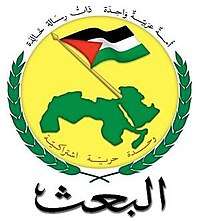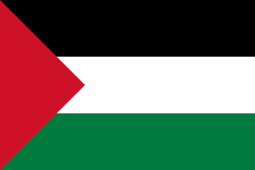Arab Socialist Ba'ath Party – Lebanon Region
Arab Socialist Ba'ath Party – Lebanon Region حزب البعث العربي الاشتراكي في لبنان | |
|---|---|
 | |
| Leader | Fayez Shukr |
| Founded | 1966 |
| Headquarters | Beirut, Lebanon |
| Ideology | Neo-Ba'athism |
| National affiliation | March 8 Alliance |
| International affiliation | Syrian-led Ba'ath Party |
| Colors | Black, Red, White and Green (Pan-Arab colors) |
| Parliament of Lebanon |
1 / 128 |
| Party flag | |
 | |
| Part of a series on | ||||||||||||||||||||||||||||
| Ba'athism | ||||||||||||||||||||||||||||
|---|---|---|---|---|---|---|---|---|---|---|---|---|---|---|---|---|---|---|---|---|---|---|---|---|---|---|---|---|
 | ||||||||||||||||||||||||||||
|
||||||||||||||||||||||||||||
|
||||||||||||||||||||||||||||
|
||||||||||||||||||||||||||||
|
Related topics |
||||||||||||||||||||||||||||
| ||||||||||||||||||||||||||||
The Arab Socialist Ba'ath Party – Lebanon Region (Arabic: حزب البعث العربي الاشتراكي في لبنان Hizb Al-Ba'ath Al-Arabi Al-Ishtiraki fi Lubnan), officially the Lebanon Regional Branch, is a political party in Lebanon. It is the regional branch of the Damascus-based Arab Socialist Ba'ath Party. Fayez Shukr has been party leader since 2005 when he succeeded Sayf al-Din Ghazi who in turn succeeded Assem Qanso.
The Lebanese branch of the undivided Ba'ath Party had been formed in 1949–1950.[1] Assem Qanso is the longest-serving secretary (leader) of the Lebanese Ba'ath Party;[2] first from 1971 to 1989 and again from 2000 to 2005.[3] During the Lebanese Civil War, the party had an armed militia, the Assad Battalion.[4] The party joined forces with Kamal Jumblatt's Progressive Socialist Party in organizing the Lebanese National Movement, seeking to abolish the confessional state.[5] The Lebanese National Movement was later superseded by the Lebanese National Resistance Front, in which the party participated.[6] The party organized resistance against Israeli forces in Lebanon.[6] In July 1987 it took part in forming yet another front, the Unification and Liberation Front.[7]
In the 2009 parliamentary election, the party won two seats as part of the March 8 Alliance. The parliamentarians of the party are Assem Qanso and Qassem Hashem.[8]
The Lebanese Ba'ath Party is also militarily involved in the Syrian Civil War, and has sent militias under its control to aid Bashar al-Assad's government against the Syrian opposition. One of the party's militia commanders, Hussein Ali Rabiha from Nabatieh, was killed during the Daraa offensive (June 2017).[9]
Party leaders
- Mahmoud Baydoun (1966–1969)
- Magali Nasrawin (1969–1971)
- Assem Qanso (1971–1989)
- Abdullah Al-Amin (1989–1993)
- Abdallah Chahal (1993–1996)
- Sayf al-Din Ghazi (1996–2000)
- Assem Qanso (2000–2005)
- Sayf al-Din Ghazi (2005–2006)
- Fayez Shukr (2006–present)
Legislative Elections
| House of Representatives | ||||||
| Election year | # of overall votes |
% of overall vote |
# of overall seats won |
+/– | Leader | |
|---|---|---|---|---|---|---|
| 1992 | ???? (#6) | ??? | 2 / 128 |
|||
| 1996 | ???? (#5) | ??? | 2 / 128 |
|||
| 2000 | ???? (#5) | ??? | 3 / 128 |
|||
| 2005 | ???? (#7) | ??? | 1 / 128 |
|||
| 2009 | ???? (#7) | ??? | 2 / 128 |
|||
See also
References
- ↑ Seddon, David (2004). A political and Economic Dictionary of the Middle East. Taylor & Francis. p. 85. ISBN 1-85743-212-6.
- ↑ "The future of Syria's pawns in Lebanon". www.lebanonwire.com. Retrieved 23 December 2014.
- ↑ The Soviet Union and the Middle East. 8. Indiana University. 1983. p. 20.
- ↑ Federal Research Division (2004). Syria: A Country Study. Kessinger Publishing. p. 282. ISBN 978-1-4191-5022-7.
- ↑ O'Ballance, Edgar (1998). Civil War in Lebanon, 1975–92. Palgrave Macmillan. p. 62. ISBN 0-312-21593-2.
- 1 2 O'Ballance, Edgar (1998). Civil War in Lebanon, 1975–92. Palgrave Macmillan. p. 149. ISBN 0-312-21593-2.
- ↑ O'Ballance, Edgar (1998). Civil War in Lebanon, 1975–92. Palgrave Macmillan. p. 179. ISBN 0-312-21593-2.
- ↑ "March14 – March 8 MPs". NOW Lebanon. 11 March 2009. Retrieved 24 October 2011.
- ↑ "Militias of Lebanese Baath party Along with the Assad forces in the battles of Daraa". Al-Dorar Al-Shamia. 15 June 2017. Retrieved 28 August 2017.